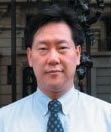
 Chaibong Hahm
Chaibong Hahm
Professor of International Relations and Political Science
Director, USC Korean Studies Institute
Chaibong Hahm joined the USC College faculty this fall and serves as the new director of the Collegeís Korean Studies Institute. Professor Hahmís areas of expertise include Korean politics, culture and political history, and political theory ó both Western and East Asian. He is the author or co-editor of a number of published and forthcoming books on Confucianism in the "Modern " and "post-Confucian " contexts. Other upcoming research projects focus on modern Korean culture and problematizing modern Korean and South Korean identities. Established in 1995, USC Collegeís Korean Studies Institute serves as the universityís principal organization for the promotion of interdisciplinary Korean education and research. The Institute also hosts scholarly conferences, academic workshops and seminars, as well as fi lm festivals and distinguished Korean visitors.
Under Hahmís leadership, a primary objective of the Institute will be to promote a greater understanding of the history, culture and dynamics of South and North Korea. In addition, Hahm envisions a continued focus on the Korean experience in America. The Instituteís location in Los Angeles, a city with the largest concentration of ethnic Koreans outside of Korea itself, makes it an ideal place to undertake research that will broaden and deepen understanding of the Korean-American experience. Born in Boston, raised and educated in South Korea and the U.S., Hahm, 46, earned a bachelorís degree in economics from Carleton College in Minnesota, and masterís and Ph.D. degrees in political science from Johns Hopkins University in Maryland.
Before coming to USC, Hahm served as Director of the Division of Social Sciences, Research and Policy at UNESCO (the United Nations Educational, Scientifi c and Cultural Organization) in Paris. Hahm also held a faculty position at Yonsei University in Seoul. He joined Yonsei as a political science professor in 1992 and served as director of the department and of the Chinese Studies program. He was also director of the Comparative Cultural Studies program at Yonseiís Institute of East and West Studies. He has been a visiting scholar at the Maison des sciences de líhomme in Paris and a visiting fellow at the International Forum for Democratic Studies in Washington, D.C. He has also been a visiting professor at Duke, Georgetown and Princeton universities.


Presented by the USC Marshall School of Business
in partnership with the U.S. Department of Commerce




